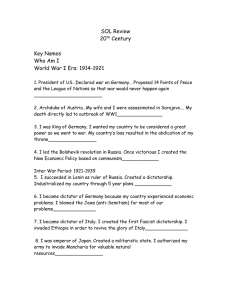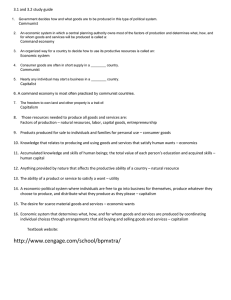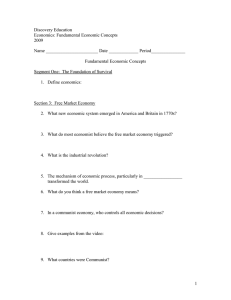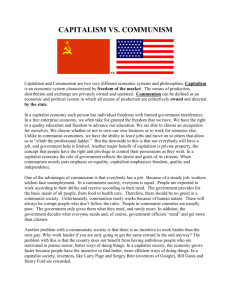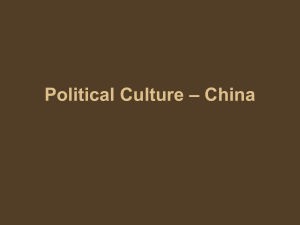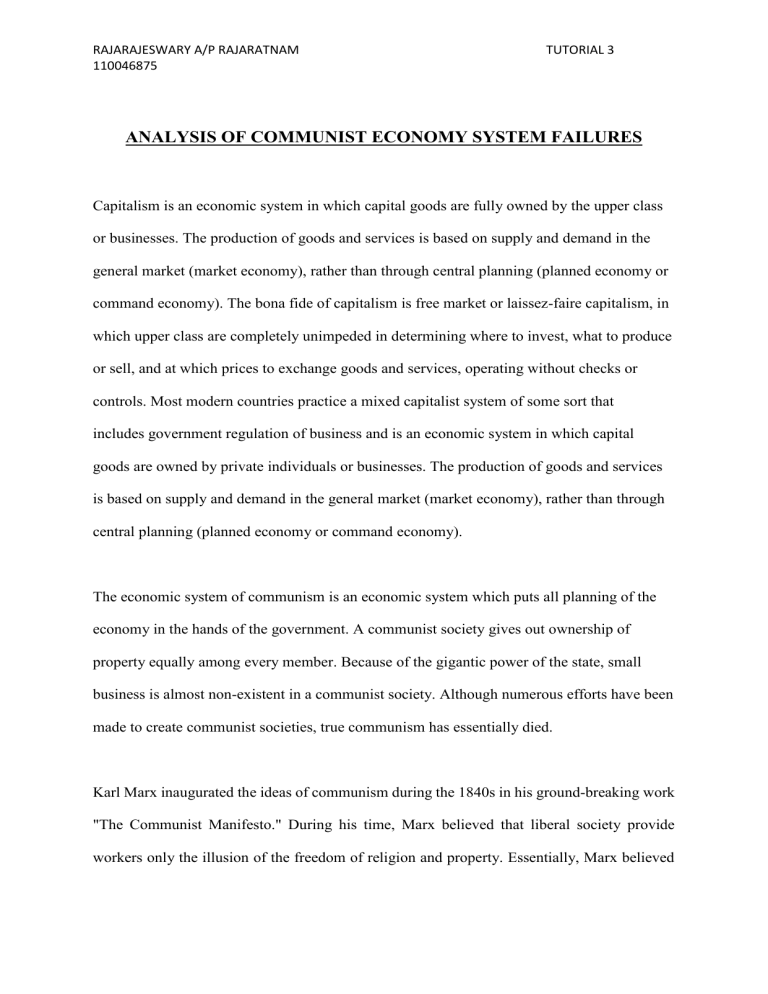
RAJARAJESWARY A/P RAJARATNAM 110046875 TUTORIAL 3 ANALYSIS OF COMMUNIST ECONOMY SYSTEM FAILURES Capitalism is an economic system in which capital goods are fully owned by the upper class or businesses. The production of goods and services is based on supply and demand in the general market (market economy), rather than through central planning (planned economy or command economy). The bona fide of capitalism is free market or laissez-faire capitalism, in which upper class are completely unimpeded in determining where to invest, what to produce or sell, and at which prices to exchange goods and services, operating without checks or controls. Most modern countries practice a mixed capitalist system of some sort that includes government regulation of business and is an economic system in which capital goods are owned by private individuals or businesses. The production of goods and services is based on supply and demand in the general market (market economy), rather than through central planning (planned economy or command economy). The economic system of communism is an economic system which puts all planning of the economy in the hands of the government. A communist society gives out ownership of property equally among every member. Because of the gigantic power of the state, small business is almost non-existent in a communist society. Although numerous efforts have been made to create communist societies, true communism has essentially died. Karl Marx inaugurated the ideas of communism during the 1840s in his ground-breaking work "The Communist Manifesto." During his time, Marx believed that liberal society provide workers only the illusion of the freedom of religion and property. Essentially, Marx believed RAJARAJESWARY A/P RAJARATNAM 110046875 TUTORIAL 3 that capitalism leads to the agenda where elites are controlling the lower classes, in certain area by giving them token of freedom yet ended up serving the upper class and the "bourgeoisie." A split between the ideas of communism and socialism, which were largely viewed as the same thing, occurred during the early 1920s when Vladimir Lenin led the Russian revolution. Lenin believed a communist society would need one-party rule to quell chaos in the country and control the economy after a peasant revolution, according to the Library of Economics and Liberty. Socialists who endorsed to Lenin's philosophy became known as "communists." A command economy is a system where the government, rather than the free market, decides the types of good that should be produced, number of products that should be produced and the price setting at which the goods are offered for sale. It also determines investments and incomes. The communist economic system is a key feature of any communist society. Cuba, North Korea and the former Soviet Union are examples of countries that have communist economic system, while China maintained a communism for decades before transforming to a mixed economy that features both communistic and capitalistic elements. Communist economic system is failed to allocate goods due to the lack of knowledge or the central planner's inability to discern quantity of goods that should be produced. Deficiencies and surpluses are common consequences of communist economic system. The government is separated from the body of consumers, whose needs are fluid rather than static. As a result, the entity that controls the means of production faces constant difficulty responding to everdemands varies across various sectors in a timely manner. In addition to that, the central government in a communist economic system sets prices relentlessly based on revenue needs, resulting in pricing that is almost always uneconomical regarding output and demand. Apart from that, there will be no freedom of speech in communist economic system. This is because, the private individuals or businesses make every decision. Large or geographically- RAJARAJESWARY A/P RAJARATNAM 110046875 TUTORIAL 3 broad populations tend to be heterogenous, making it unfavourable to fix a common goal or set of rules for shared effort and resources. Furthermore, central planning is difficult to achieve in communist system due to the disorganized leadership. Consumer’s needs are not taken into consideration. Moreover, productivity and efficiency are impossible to achieve without profitability for the labour which is one of the reason for the failure of communism. It is difficult to achieve internal balances between supply and demand without a price mechanism. In command economy, the leaders create a plan that outlines their decisions. It's implemented with laws, regulations, and directives. The aim of the plan is to give to "each according to his need." Communist countries have free healthcare, education, and other services. The plan also seeks to increase the nation's economic growth. It secures national defence and maintains infrastructure. Many of the personal freedoms that capitalist societies take for granted are eliminated under a communist regime. Not only is freedom of speech completely taken away, but those who openly criticize the workings of the government are often subject to severe and overly harsh punishments. Even if a family is able to save money from their typically meager earnings, they are not allowed to provide any sort of inheritance for their family members after they have deceased. Equality is great, but when a person is not able to accumulate any sort of savings or personal property, this leaves their close relatives with very little to remember them by once they are gone. Creative pursuits are no longer encouraged. Communism focuses on production and agriculture, things that will support the long-term growth of the nation. When this happens, RAJARAJESWARY A/P RAJARATNAM 110046875 TUTORIAL 3 art and music tend to fall by the wayside. If you cannot own artwork or earn a pay check creating music, there is very little motivation to partake in creative outlets. The state owns businesses on behalf of the workers. In effect, the government owns a monopoly. The government rewards company managers for meeting the targets detailed in the plan. In communism, central planners replace the forces of competition and the laws of supply and demand that operate in a market economy. They also replace the customs that guide a traditional economy. Unfortunately, communism often leads to widespread corruption among elected officials and typically encourages greed. The goal is to allow everyone to obtain an equal profit for the work they’ve done, but it rarely works this way. When the lower class is unable to question the actions of their superiors, this amount of power tends to corrupt those who have it. The ruling class of communist nations tends to become quite greedy, since there is no way for the classes beneath them to gain insight into how their nation truly works. Market competition is a primary force of improvement, but it is not found in a command economy. After all, the government is the one owning all the industries. Plus, it does not encourage competition, and, it even tries to eliminate it. You would not certainly see the benefits of competition in countries implementing this economic system. In a command economy, the needs of the society are often ignored for its betterment. For workers, they will not be given a choice on where they can move or where they can work. RAJARAJESWARY A/P RAJARATNAM 110046875 TUTORIAL 3 Almost all countries in the region saw a return to growth in 2010 and early 2011, with the rebounds tending to be strongest in the countries that had seen the largest output falls in 2009—notably the Baltic and CIS countries. But a range of factors increasingly took their toll. The lingering effects of weak private and public balance sheets, along with the emerging euro area crisis, damaged growth through financial sector retrenchment and withdrawal of fiscal stimulus (as discussed in Chapters IX and XI) as well as effects on confidence, investment and trading partner demand. The result was a marked slowdown in growth in 2012 affecting every country of the region, with nine slipping back into recession. The easing of the euro zone crisis since mid-2012 has given some respite. But the shocks have left lasting damage to regional growth prospects. While subject to a high degree of uncertainty, IMF estimates suggest that potential output for the region has declined sharply since 2008 and is likely to remain subdued going forward. This contrasts with relatively unchanged estimates of potential output for many other emerging markets. The growth model that yielded increased income levels and economic convergence prior to the crisis is unlikely to be available going forward because the elements underpinning this model—strong trading partner growth and ample foreign bank financing—will probably not return soon. Instead, strengthening global competitiveness through renewed efforts to implement structural reforms, and restoring the capacity of the banking system to supply credit to the economy, are likely to be key prerequisites for raising potential growth in the future. RAJARAJESWARY A/P RAJARATNAM 110046875 TUTORIAL 3

